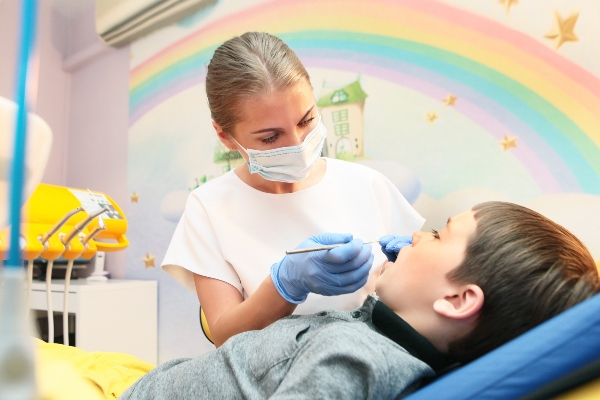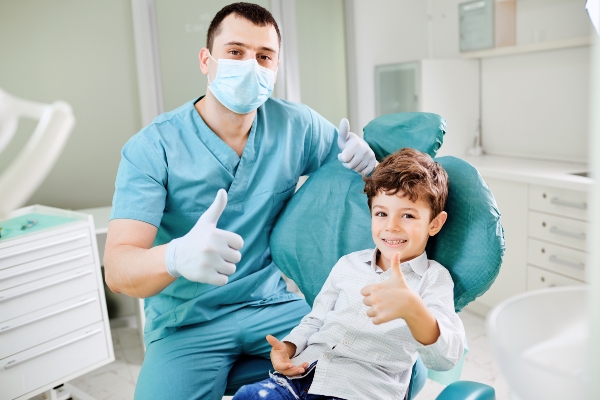5 Pediatric Dentistry Tips for Baby Teeth

When it comes to caring for a child’s teeth, pediatric dentistry offices are an excellent resource. This section of the dental field focuses on providing dental services for children. Pediatric dentists are trained on the common problems among infants, children and teenagers. They are the go-to dental professional when parents have questions or concerns about their child’s teeth.
Why taking care of baby teeth is important
Even though it may seem like taking care of baby teeth is not as important as taking care of permanent teeth, this is simply not true. Baby teeth play a significant role in the development of your child’s permanent teeth. They are especially important for proper jaw development, allow the ability to chew food and support a child’s ability to talk.
Tips for caring for your child’s teeth
We lay out five excellent tips for parents to help you take better care of your child’s baby teeth. You may already follow some of these methods but read over each to ensure you are doing these properly.
Cleaning
There is a correct way to clean baby teeth. Wiping the mouth with a clean, soft cloth until the child is about 18 months of age is recommended. After this age, a small amount of toothpaste placed on a soft-bristled toothbrush can be used to clean this first set of teeth. Small circular motions around the gum line remove food particles and promote good gum health.
Flossing
You should floss your child’s teeth as soon as they begin to touch each other. Once more baby teeth begin to grow in, it is essential to floss between them to remove any food that may be hiding near the teeth.
Food and Drink
All children need to consume a healthy and balanced diet. Finding substitutes for high sugar foods is suggested, as these types of foods promote tooth decay. Fruits and vegetables can also help to clean the teeth while being good for the body.
Prevent bad habits
Bad habits that are known to harm baby teeth include prolonged or chronic bottle use, pacifier use and thumb sucking. Excessive pacifier use and thumb sucking often lead to bite problems in children. An article in the journal entitled Paediatrics & Child Health found a change in children’s teeth due to pacifier use. After age 2, pacifier use may start to alter a child’s teeth. Call your pediatric dentistry office to see when it is best to end pacifier use.
Check for concerns
You should look at your child’s mouth at least once a week to make sure that their baby teeth look healthy. Signs of potential problems include brown or white stains on the teeth, red or swollen gums and loose teeth.
Does your child need a dentist?
Your child’s baby teeth play an important role in the formation of their adult teeth. By following these tips, you can ensure they have the proper at-home care. If your child is over 1 year old and has not seen the dentist, please call our pediatric dentistry office to schedule a visit. Proper care can help prevent small issues from becoming large problems.
Request an appointment here: https://www.grandparkwaypediatricdental.com or call Grand Parkway Pediatric Dental at (832) 579-0960 for an appointment in our Richmond office.
Check out what others are saying about our services on Yelp: Read our Yelp reviews.
Recent Posts
Many children fear going to the dentist. However, a kid's dentist can transform these essential dental visits into a fun and educational experience. Through their specialized training, these dental professionals create an environment that can help alleviate fear around dental care and promote positive dental experiences for young patients.When children step into a kid's dentist's…
A child’s visit to the kids dentist does not have to be a point of contention. Many children grow to look forward to their dental appointments if they go to pediatric dentists who focus on kids because their offices are often entirely different from those that more broadly treat adults.Since children need to go to…
Seeking the help of a kids dentist to maintain your child’s oral health is a serious responsibility. As a parent, you must ensure that your child’s dentist will be able to care for your child’s general well-being. Knowing what your dentist can do for your child is a motivator to bring your child in for…
Finding the right kids dentist is important for protecting your child's oral health future. In addition to finding a skilled pediatric dentist who can build a solid rapport with your child, the location and convenience are also important. We hope this simple guide to finding a kids dentist near you simplifies your search.A kids dentist…


